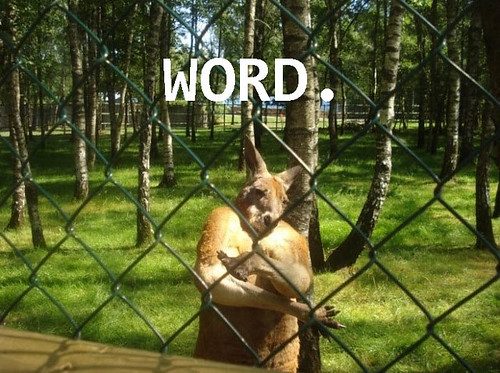
Photo by ketrin1407
This Sunday marks the 147th anniversary of the birth of British writer Rudyard Kipling. The author of The Jungle Book was highly prolific, penning numerous short stories and poems, and three novels. Along the way, he coined and popularized quite a few words. Here are 10 of our favorites.
it
“’Tisn’t beauty, so to speak, nor good talk necessarily. It’s just It. Some women’ll stay in a man’s memory if they once walked down a street.”
Rudyard Kipling, Traffics and Discoveries, 1904
Kipling’s is the earliest recorded use of it meaning “sex appeal (especially in a woman).” The term was later popularized by British novelist and scriptwriter Elinor Glyn in her 1927 novel, It. Glyn went on to help “make a star of actress Clara Bow for whom she coined the sobriquet ‘the It girl’.”
just-so story
“But these days, some of the most frequent and pungent disparagements of Kipling have been delivered not by defenders of political correctness, or even by the gatekeepers of literary greatness, but by, of all people, biologists, for whom ‘just-so story’ has become a phrase of opprobrium.”
David P. Barash and Judith Eve Lipton, “How the Scientist Got His Ideas,” The Chronicle Review, January 3, 2010
A just-so story is “a story that cannot be proven or disproven, used as an explanation of a current state of affairs.” The phrase comes from Kipling’s Just-So Stories, “fictional and deliberately fanciful tales for children, in which the stories pretend to explain animal characteristics, such as the origin of the spots on the leopard.”
kissage
“Ere they hewed the Sphinx’s visage
Favoritism governed kissage,
Even as it does in this age.”
Rudyard Kipling, Departmental Ditties and Barrack Room Ballads, 1922
Kissage, another word for kissing, may have regained popularity from its usage in a 1998 episode of Buffy the Vampire Slayer: “It’s like, freeze frame. Willow kissage – but I’m not gonna kiss you.”
grinch
“It’s woe to bend the stubborn back
Above the grinching quern,
It’s woe to hear the leg bar clack
And jingle when I turn!”
Rudyard Kipling, “The Lament of the Border Cattle Thief,” Ballads and Barrack-Room Ballads, 1897
Grinch in this context means “to make a harsh grating noise,” says the Oxford English Dictionary, and may be related to the French grincer, “to grate, creek, screech.”
Related to grincer is grincheux, a cranky person. Some speculate that Theodor Geisel, aka Dr. Seuss, may have been influenced by grincheux when coming up with the name of that ultimate holiday killjoy.
old-school tie
“After which, it is only fair to tell you that I tied up my platoon on parade this morning owing to an exalted mentality which for the moment (I was thinking over the moral significance of Old School ties and the British social fabric) prevented me from distinguishing between my left hand and my right.”
Rudyard Kipling, Limits and Renewals, 1932
Old-school tie refers to “a necktie that has the colors of a British public school”; “the upper-middle-class solidarity and system of mutual assistance attributed to alumni of British public schools”; and “the narrow clannish attitudes characteristic of the members of a clique.”
Old school, meaning “of the old school; of earlier times; as originally or formerly established, propounded, or professed; old or old-fashioned,” is much older, originating around 1749, according to the Online Etymology Dictionary.
overseas
“All things considered, there are only two kinds of men in the world—those that stay at home and those that do not. The second are the most interesting. Some day a man will bethink himself and write a book about the breed in a book called ‘The Book of the Overseas Club,’ for it is at the clubhouses all the way from Aden to Yokohama that the life of the Outside Men is best seen and their talk is best heard.”
Rudyard Kipling, Letters of Travel, 1920
Kipling’s usage is the earliest recorded of this meaning of overseas: “of, relating to, originating in, or situated in countries across the sea.”
Overseas Chinese refers to “a person or people of Chinese ethnicity, living in a non-Chinese country.” Overseas experience, says the OED, is either “experience of life and culture in an overseas country,” or a New Zealand term for “an overseas working holiday, usually to Britain or Europe, undertaken by young New Zealanders and freq. considered as a virtually obligatory part of an informal education.”
penny-farthing
“Remembering what she had done, it was pleasant to watch her unhappiness, and the penny-farthing attempts she made to hide it from the Station.”
Rudyard Kipling, Plain Tales from the Hills, 1888
Penny-farthing, or pennyfarthing, meaning “ineffective,” was formed by combining penny and farthing, “an English piece of money equal to one fourth of a penny,” says the Online Etymology Dictionary, “the two together making but a small sum.”
Penny-farthing, “an early bicycle having a large front wheel and much smaller rear one” (perhaps named for the different sizes of the coins), came about later in 1927.
slack-jawed
“Look you, I have noticed in my long life that those who eternally break in upon Those Above with complaints and reports and bellowings and weepings are presently sent for in haste, as our Colonel used to send for slack-jawed down-country men who talked too much.”
Rudyard Kipling, Kim, 1901
Slack-jawed means “with the mouth in an open position and the jaw hanging loosely, especially as indicating bewilderment or astonishment,” or “unsophisticated or unthinking; dimwitted in appearance.”
Cletus Spuckler, aka “Cletus the Slack-Jawed Yokel,” is a stereotypical redneck character on the animated TV series, The Simpsons.
squiggly
“The squiggly things on the Parsee’s hat are the rays of the sun reflected in more-than-oriental splendour, because if I had real rays they would have filled up all the picture.”
Rudyard Kipling, Just So Stories, 1907
Squiggly may come from the older squiggle, which originally meant “to work wavy or intricate embroidery,” according to the OED, before it came to mean, more commonly, “to squirm and wriggle,” or “to move about like an eel.”
Svengali
“’I’m glad Zvengali‘s back where he belongs.”
Rudyard Kipling, A Diversity of Creatures, 1917
A Svengali is “a person who, with evil intent, tries to persuade another to do what is desired,” and is named for Svengali, “the hypnotist villain” in the 1894 novel Trilby by George du Maurier.
Kipling’s is the first recorded figurative use of Svengali. In the quote, the speaker is referring to “a dog with a mesmeric stare,” says the OED.
[Photo: CC BY 2.0 by ketrin1407]




